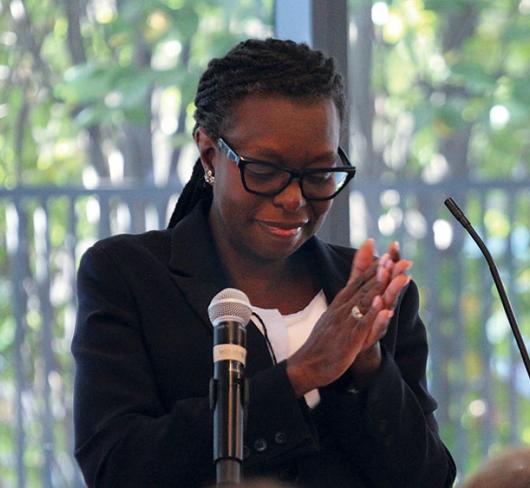A Voice at the Table: ETFO Helps Shape Government Decision-Making (Professional Services)
When the Harris Conservatives took power in 1995 Ontario’s education system experienced dramatic, and often negative, change. The Tories cut education funding and denigrated the role of teachers as professionals. The Harris years marked an end to the working relationship that had previously existed between the Ministry of Education and the federations.
Today, after three years of Liberal government, the picture has changed dramatically. ETFO leaders and staff once more have a voice as the government plans new initiatives or reforms existing programs. The Ministry recognizes the importance of federation involvement and is promoting it. A recent memo states:
Research and effective practice emphasize the importance of strong relationships in the successfulimplementation of induction programs. As such, the Ministry strongly recommends that boards includethe federation representative from their NTIP Steering Committee as part of the team attending thissession.
Regional manager memorandum to directors of education
The Education Partnership Table
The Education Partnership Table, a ground-breaking model for stakeholder consultation, allows the government to hear directly from those closest to what’s happening in Ontario schools. The table includes members of organizations representing school boards, supervisory officers, principals, teachers, support workers, parents, and students. The partnership table and its related working tables have become truly meaningful and productive forums to discuss and develop consensus-based education policy.
The Education Partnership Table, established by former Education Minister Gerard Kennedy, has worked on such key policy issues as reform of the Ontario College of Teachers, the new teacher induction program, a framework for ongoing professional learning, teacher performance appraisal, and fostering greater parent involvement in education.
The Working Tables
ETFO participates in working tables on a variety of issues.
• Literacy and Numeracy
ETFO provides the voice of classroom teachers at this working table. In advising the Literacy and Numeracy Secretariat, ETFO has raised concerns about system overload resulting from the number of new initiatives being introduced and has highlighted the disconnect between instructional practice and the pressure to report according to the provincial report card format.
• Special Education Reform
This working table has provided input on a report to the Minister of Education, and has made a total of 30 recommendations on such key issues as student success and access to curriculum, professional development, parent collaboration, accountability and reporting, and special education funding.
• Teacher Development
As a result of ETFO’s input into this working group, teachers are now required to undergo appraisal once every five years, instead of once every three years and a satisfactory/ unsatisfactory rating system rather than a four-step evaluation scheme will be used. Staff continue to provide input on such issues as the New Teacher Induction Program, alternative ways to assess teachers for entry to practice, and the feasibility of implementing additional PD days.
• Learning to 18
ETFO is the only elementary voice at this working table which focuses on issues related to the success of students from Grade 7 to 12. The group has recommended such changes as: reducing the number of curriculum expectations to allow teachers more flexibility in designing integrated learning programs; a new technological education curriculum to give students hands-on experience; and extending the role of guidance counsellors in elementary schools.
ETFO also participates in the following:
• The Ontario Education Research Panel
This panel, the first of its kind in Ontario, includes appointees from the university sector, school boards and ETFO. Its goal is to promote education research and evaluation activities that will help improve education in this province. It supports the focus on evidence and research as drivers for educational change.
• The MISA Advisory Committee
MISA is a focused strategy to improve the capacity of all parts of the education system to work with data to support improved student achievement.
• Healthy Schools
This table includes representatives of education and community organizations who are collaborating on the Ministry’s plans for a healthy schools recognition program.
• The Advisory Committee on Curriculum Implementation
The committee advises the Curriculum and Assessment Policy branch on curriculum implementation and review.
• The Student Success Commission
The commission provides input into policy directions and initiatives relating to Grades 7 to 12.
Enhanced Professional Development
In the spring of 2006 the Ministry of Education provided ETFO with $7.8 million for professional development, allowing the Federation to significantly expand programs for members. Here is a list of some of those initiatives. (Plans are still in development for many other programs to be offered over the next two years.)
Summer Academy
The 2006 Summer Academy featured an expanded list of courses at a lower cost, which allowed some 1000 members to take part in 50 three-day workshops. The additional Ministry funding allowed ETFO to provide several new courses including: reaching at-risk students in the intermediate division, daily physical activity, and special education.
Regional Kindergarten Institutes
The institutes began with three-day courses this summer, to be followed by a symposium in each region. Participants also take part in an online professional learning community. A Kindergarten resource manual is in development.
Enhancing Academic Success for Low-Income Students.
A major component of the new programming will focus on providing support for members and schools who support students living in poverty.
Dr. Joe Flessa, OISE/UT professor, is preparing a literature review, and proj- ect team members are visiting schools across the province to observe existing innovative programs. Staff anticipate that this project will culminate with a national symposium in the spring of 2008.
Two special issues of Voice will focus on best practices in professional development and on programs and teaching strategies that have been shown to contribute to academic success for students from low socio-economic back- grounds.
The Face of Adolescent Learning is a conference for Intermediate teachers that will address such issues as: assessment for learning; engaging reluctant learners; information and communications technology; and adolescent development. Look for flyers on your school bulletin board or visit etfo.ca for more information.
Mentorship and Induction for Beginning Occasional Teachers
This pilot project focuses on mentorship and induction for beginning short-term occasional teachers. More new graduates are becoming occasional teachers than are being hired on contract but short-term OTs are not funded to be part of new teacher induction programs.
The pilot project will match beginning short-term OTs with experienced colleagues and provide them with paid release time for mentorship meetings and observation days. In addition, they will have access to an orientation session and PD opportunities developed by ETFO and geared to their specific needs.
The project is offered by ETFO in partnership with the Hamilton- Wentworth Occasional Teacher Local, the Teaching Policy and Standards Branch of the Ministry of Education, and the Hamilton- Wentworth District School Board. It is hoped the pilot will persuade the Ministry of Education to fund a full mentorship and induction program for these new teachers.

